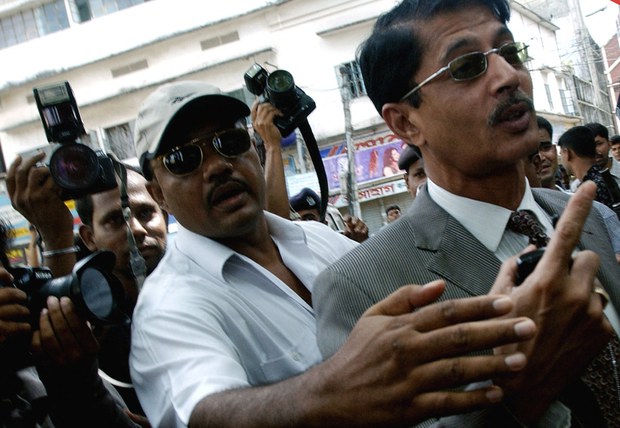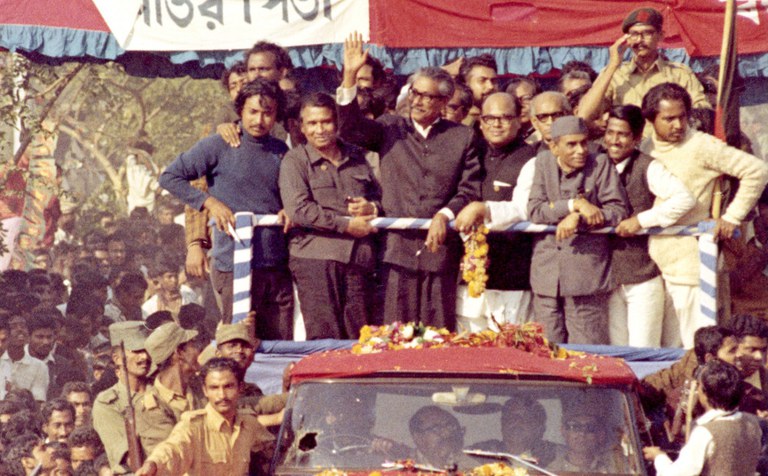Malaysia Arrests Ex-Dhaka Envoy Previously Implicated in 1975 Killings of Bangladesh Leaders
2022.02.10
Dhaka and Kuala Lumpur
 M. Khairuzzaman (right), a former army officer, arrives at a court in Dhaka during his trial on charges related to the jailhouse killings in November 1975 of four senior officials from Bangladesh’s government that was deposed in a military coup, Sept. 7, 2004. He was acquitted of the charges.
M. Khairuzzaman (right), a former army officer, arrives at a court in Dhaka during his trial on charges related to the jailhouse killings in November 1975 of four senior officials from Bangladesh’s government that was deposed in a military coup, Sept. 7, 2004. He was acquitted of the charges.
Malaysia on Thursday announced the arrest and pending extradition of a former Bangladeshi ambassador to Kuala Lumpur, who previously had been implicated back home for his alleged involvement in the 1975 jailhouse killings of four officials from a deposed government.
M. Khairuzzaman, the former Bangladeshi high commissioner to Malaysia, is a retired military officer who has been living in the Kuala Lumpur area for more than a decade.
“We hope to bring him back soon,” M. Shahriar Alam, Bangladesh’s state minister for foreign affairs, told reporters at the foreign ministry in Dhaka on Thursday. “The Home and Law ministries will jointly look into whether there is an opportunity to revive the [jail killings] case against him or what steps can be taken afterward.”
Shahriar said the Malaysian home ministry had issued a written notice to the Bangladesh government of Khairuzzaman’s arrest for “violating immigration laws.”
“Those who are arrested on Malaysian immigration issues are kept at deportation centers to be deported to their home countries. He is also held there,” Shahriar said.
“As far as I know or understand, there is an opportunity to physically interrogate him again in relation to the jail killing case,” he said. “The Law Ministry would be better able to say.”
Khairuzzaman had previously been implicated in turmoil that followed a military coup in August 1975, when Bangladesh’s founding leader, the father of the current prime minister, was assassinated. Twenty-nine years later, when Bangladesh was led by the party that is the main opposition party today, a court acquitted Khairuzzaman of those charges.
Shahriar was asked if Khairuzzaman was being returned because of the case tied to the jailhouse killings back in 1975.
“If any expatriate commits a crime, if someone overstays in a country or falls into irregularities, we bring him back. That process will be followed in his case,” he replied. “Immigration law has been violated, the Malaysian government has told us, we are bringing back a citizen of Bangladesh, that’s all.”
In Malaysia on Thursday, an official confirmed that local authorities had picked up Khairuzzaman, who holds a U.N. refugee card, from his home in Ampang, near Kuala Lumpur.
“Yes, he was arrested yesterday morning, and will be deported to Bangladesh. The immigration department assisted the Bangladeshi police in this arrest,” the senior government source who requested anonymity because he was not authorized to speak to the press, told BenarNews.
In Putrajaya, Malaysian Home Minister Hamzah Zainuddin told reporters that Khairuzzaman’s arrest was lawful.
“Based on the rule of law, if there is an offense, we arrest, or if there is a request from the country of origin and if we found there is truth to it,” Hamzah told reporters.
“All that was done, we did it according to procedure,” he said without elaborating.
Khairuzzaman and other military personnel were accused of killing four founding leaders of Bangladesh – Syed Nazrul Islam, Tajuddin Ahmad, M. Mansur Ali and A.H.M. Quamruzzaman – inside the Dhaka Central Jail in November 1975.
The killings followed the assassination of Sheikh Mujibur Rahman, the country’s founding father and Prime Minister Sheikh Hasina’s father.

Three other defendants were convicted and sentenced to death in 2004 – nearly three decades after the killings. Two years later, the High Court acquitted two of the defendants and upheld the death sentence for the third. Prosecutors appealed and in 2013 all three, who had absconded, were sentenced to death by the Appellate Division.
Khairuzzaman, meanwhile, was acquitted of similar charges in 2004. He had been appointed director general of the Foreign Affairs Ministry one year earlier in a coalition government led by Prime Minister Khaleda Zia, Hasina’s nemesis.
Khairuzzaman had been serving as a diplomat in Kuala Lumpur when Hasina returned to power in 2009. Ordered back to Dhaka, he chose to stay in Malaysia and received a refugee card from UNHCR.
“No law or regulation should be enacted by the U.N. where a member-state’s interests are harmed or a legal process is hampered,” Shahriar said when asked about the card. “It’s not supposed to happen. We will look into the matter.”
Malaysian human rights lawyer Sumitha Shaanthinni noted the country is not a signatory to the refugee convention so it has no obligation to provide any protection to refugees, adding UNHCR’s presence in Malaysia is on humanitarian grounds.
“However, legal scholars argue that the Universal Declaration of Human Rights in its entirety – including the right to seek asylum – has become a part of customary international law. As such, no state should violate the customary international law principle of non-refoulment,” she said.
Pointing to Rohingya, she said Malaysia has violated the custom many times by deporting UNHCR card holders.
UNHCR officials in Kuala Lumpur did not immediately respond to queries from BenarNews about Khairuzzaman’s case and his pending deportation.
Meanwhile, the Bangladesh High Commission in the Malaysian capital declined to comment when contacted by BenarNews. The Malaysian immigration and police departments also did not respond immediately to requests for comment.







